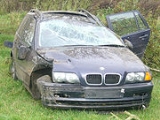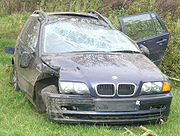
Totaled
Encyclopedia

Vehicle
A vehicle is a device that is designed or used to transport people or cargo. Most often vehicles are manufactured, such as bicycles, cars, motorcycles, trains, ships, boats, and aircraft....
is damaged and the cost of repair and salvage would exceed the vehicle's market value. Generally, the insurance provider will only pay out the lesser cost of buying a replacement vehicle, instead of paying to repair the old one to its previous state.
United Kingdom
In the UK, a car in this condition is called a write-offWrite-off
The term write-off describes a reduction in recognized value. In accounting terminology, it refers to recognition of the reduced or zero value of an asset. In income tax statements, it refers to a reduction of taxable income as recognition of certain expenses required to produce the income...
, an accountancy term which means the value of the car is now worthless, therefore it cannot be included in the accounts. However, it is worth noting that although a car has been written off, it is not truly worthless, in that usually it will still contain salvageable used parts, or at a bare minimum still have value as scrap metal. All that is required for a vehicle to be a write-off is that it would cost more to return to marketable condition than the market value it would then have. So a vehicle of low value may even be written off when fully roadworthy, for example due to damage to paintwork or upholstery.
Write-offs can be distressing for the owner as the amount offered by the insurance company is normally its "market value" at the time. If the car was rare, or simply in excellent condition compared to others of its age and type, the market value may not allow the owner to purchase an identical vehicle. For this reason, many insurers offer "agreed value" cover for owners of classic vehicles, which guarantees a set financial sum in the event of a total loss. There is normally a rule that the vehicle must be at least 10 (or 15) years old for mass-market models, although for specialist cars, such as Ferraris, agreed value cover may be available from an earlier age.
US and Canada
In many jurisdictions a vehicle designated as a "total loss" (commonly referred to in the US as being totaled) is sold by insurance companies to general public, auto dealers, auto brokers, or auto wreckers. If the vehicle is not severely damaged, it can be restored to its original condition. After a government approved inspection, the vehicle can be put back on the road. However, the inspection may not reveal the quality of repair job. A professional mechanic or inspector should be consulted to make sure repairs are of proper quality and adequate. However, if the vehicle is severely damaged as per standards set by state or provincial governments, the vehicle is dismantled by an auto wrecker and is sold as parts or scrapped.Developing countries
In developing countries, the wages paid to mechanics and other repair personnel can be a fraction of the wages paid in developed countries. Also, the regulatory standards for certifying and testing vehicles for roadworthiness may not be as strict. Since labor rates and regulatory compliance are a significant portion of automotive repair costs, major repair work could be much cheaper to perform in a developing country, raising the threshold of what damage level would be declared a total loss. Correspondingly, in some developing countries such as ParaguayParaguay
Paraguay , officially the Republic of Paraguay , is a landlocked country in South America. It is bordered by Argentina to the south and southwest, Brazil to the east and northeast, and Bolivia to the northwest. Paraguay lies on both banks of the Paraguay River, which runs through the center of the...
there is a growing market for totaled North American cars, which are repaired and resold locally. However, the quality of the repair may vary.

